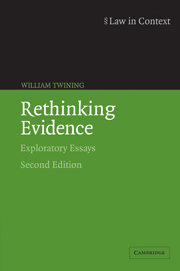Book contents
- Frontmatter
- Contents
- Preface
- Acknowledgements
- List of abbreviations
- Table of cases
- 1 Introduction: the story of a project
- 2 Taking facts seriously
- 3 The Rationalist Tradition of evidence scholarship
- 4 Some scepticism about some scepticisms
- 5 Identification and misidentification in legal processes: redefining the problem
- 6 What is the law of evidence?
- 7 Rethinking Evidence
- 8 Legal reasoning and argumentation
- 9 Stories and argument
- 10 Lawyers' stories
- 11 Narrative and generalizations in argumentation about questions of fact
- 12 Reconstructing the truth about Edith Thompson the Shakespearean and the jurist
- 13 The Ratio Decidendi of the Parable of the Prodigal Son
- 14 Taking facts seriously – again
- 15 Evidence as a multi-disciplinary subject
- Bibliography
- Index
4 - Some scepticism about some scepticisms
Published online by Cambridge University Press: 15 December 2009
- Frontmatter
- Contents
- Preface
- Acknowledgements
- List of abbreviations
- Table of cases
- 1 Introduction: the story of a project
- 2 Taking facts seriously
- 3 The Rationalist Tradition of evidence scholarship
- 4 Some scepticism about some scepticisms
- 5 Identification and misidentification in legal processes: redefining the problem
- 6 What is the law of evidence?
- 7 Rethinking Evidence
- 8 Legal reasoning and argumentation
- 9 Stories and argument
- 10 Lawyers' stories
- 11 Narrative and generalizations in argumentation about questions of fact
- 12 Reconstructing the truth about Edith Thompson the Shakespearean and the jurist
- 13 The Ratio Decidendi of the Parable of the Prodigal Son
- 14 Taking facts seriously – again
- 15 Evidence as a multi-disciplinary subject
- Bibliography
- Index
Summary
Introduction
As dependent variable, the law is potentially a particularly vulnerable target for what Berger has termed the ‘debunking motif inherent in sociological consciousness’. This is perhaps especially true of the criminal law and criminal justice systems, which offer the promise of a particularly rich harvest to the sociologist anxious to indulge his perennial preoccupation with irony, latent function and the overlap and interpenetration of vice and virtue. For here are to be found society's most solemn proscriptions of unrighteousness on the one hand, and on the other its most formal procedural prescriptions as to how to deal with it.
Colin LowThere is a sense in which we are all relativists of one kind or another. In order to distinguish between different kinds we need a map. The sceptical, debunking tendency which is said to make sociology ‘particularly at home in the temper of the modern era’, also runs through much recent literature about legal processes. It is appropriate that the jurist who urged us most forcefully to study fact-finding in law, called his theory ‘fact-scepticism’ and devoted a whole book to the study of historical relativism. Jerome Frank is, of course, by no means unique. Rabelais's Bridlegoose throws dice to decide cases; some logicians point to the limited role of closed system logic in reasoning towards particular conclusions of fact; some doubt whether induction and paraduction deserve to be classified as ‘reasoning’ at all; the recent debate about probabilities is set within a framework in which there is general agreement that mathematical probabilities have at best a very limited practical application in law; Eggleston, for example, points to the fallacies, logical jumps and pitfalls for the unwary that can be found in actual examples of practical reasoning in legal contexts.
- Type
- Chapter
- Information
- Rethinking EvidenceExploratory Essays, pp. 99 - 164Publisher: Cambridge University PressPrint publication year: 2006
- 3
- Cited by



